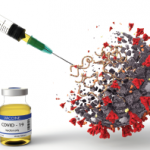
3d imagination / shutterstock.com
Lupus & Perinatal Outcomes
Adverse perinatal outcomes before & after diagnosis with systemic lupus erythematosus among African American Women
By Meghan Angley, PhD, & S. Sam Lim, MD
Why was this study done? Previous studies have suggested that women with systemic lupus erythematosus (SLE) may experience adverse perinatal outcomes, including preterm and small-for-gestational-age birth, in the years before an SLE diagnosis. However, limited research exists on adverse perinatal outcomes among African American women before they were diagnosed with SLE.
What were the study methods? Women with SLE identified from the Georgia Lupus Registry and the Georgians Organized Against Lupus Cohort were linked with birth certificates by the Georgia Department of Public Health. Births were categorized as occurring three or more years before the SLE diagnosis, up to three years before the diagnosis, up to three years after the diagnosis or three or more years after the SLE diagnosis. We also obtained a set of birth certificates for the general population of African American women in the same geographic area from the National Center for Health Statistics. The risk of preterm or small-for-gestational-age birth among women diagnosed with SLE before and after their diagnosis was compared with the risk in the general population, adjusting for maternal age and education and parity.
What were the key findings? African American women who would eventually be diagnosed with SLE did not have an elevated risk of preterm or small-for-gestational-age birth three or more years before their SLE diagnosis. However, women who would eventually be diagnosed with SLE had a 71% increased risk of preterm birth and a 138% increased risk of small-for-gestational-age birth up to three years before their SLE diagnosis. The risk of preterm or small-for-gestational-age birth was even higher after their SLE diagnosis. After diagnosis, the risk of preterm or small-for-gestational-age birth among women with SLE was nearly three times the risk in the general population of African American women.
What are the main conclusions? African American women may have an increased risk of adverse perinatal outcomes even before a clinical diagnosis of SLE, although the risk is highest among women who have already been diagnosed with SLE.
What are the implications for patients? Women who have already been diagnosed with SLE should discuss their pregnancy intentions with their providers to ensure optimal health prior to pregnancy and to develop a treatment plan compatible with pregnancy.
What are the implications for clinicians? Clinicians, especially those working with African American women, should have a lower threshold to suspect SLE. This also underscores the importance of introducing reproductive and family planning discussions early after diagnosis in all women, but particularly in African American women.
The study: Angley M, Drews-Botsch C, Lewis TT, et al. Adverse perinatal outcomes before and after diagnosis with systemic lupus erythematosus among African American women. Arthritis Care Res (Hoboken). 2021 Dec. Online first.
Disrupted Care
Medication interruptions & subsequent disease flares during the COVID-19 pandemic: A longitudinal online study of patients with rheumatic disease
By Tiffany Dharia, MD, & Michael George, MD
Why was this study done? Prior studies have shown that patients with autoimmune rheumatic diseases (ARDs) had frequent healthcare disruptions and interruptions in the use of their disease-modifying anti-rheumatic drugs (DMARDs) early in the pandemic. However, limited research exists on how these disruptions affected patient health or how patient concerns and behaviors changed over time.
What were the study methods? Adults older than 18 in ArthritisPower, the Vasculitis Patient-Powered Research Network, and other patient organizations were invited to join a 52-week longitudinal study, with baseline surveys completed March 29 to June 30, 2020, and follow-up through May 2021. At baseline, patients were asked to report demographic data, including country, city and ZIP code, as well as rheumatic conditions, comorbidities, and medications used to treat their ARD. Also at baseline and at each follow-up survey, patients reported respiratory illnesses within the prior two weeks, any COVID-19 testing/diagnosis since the prior survey, use and availability of telemedicine, current DMARD use, interruptions in DMARD use and anxiety. To evaluate the associations between interruptions in DMARD use and self-reported disease flares at the next survey, we used logistic regression incorporating generalized estimating equations, adjusting for demographic characteristics, medications, disease and calendar time.
What were the key findings? Average Patient-Reported Outcomes Measurement Information System (PROMIS) anxiety T scores decreased from April 2020 (58.7) to May 2021 (53.7). Interruptions in DMARD use decreased from April (11.2%) to December 2020 (7.5%), but then increased through May 2021 (14.0%). These medication interruptions were associated with a significant increase in severe flares (rated ≥6 of 10) at the next survey (12.9% vs. 8.0%), demonstrating the importance of avoiding unnecessary medication interruptions.
What are the main conclusions? Over the course of 14 months during the COVID-19 pandemic, patients experienced frequent interruptions in DMARD use, often associated with severe disease flares. While anxiety and interruptions in DMARD use improved throughout 2020, interruptions in DMARD use increased in 2021, perhaps related to self-discontinuation or physician-directed discontinuation around the time of vaccination.
What are the implications for patients? Patients with ARDs should discuss medication use and interruptions with their physician. Our results highlight the importance of maintaining continuity of care and avoiding unnecessary or prolonged interruptions in DMARD use.
What are the implications for clinicians? Ensuring that patients have access to clinicians to maintain continuity of care and close communication to help them navigate a confusing and constantly changing landscape is important. Methods to proactively identify patients who lose contact with the healthcare system may help prevent unnecessary interruptions in DMARD use.
The study: Dharia T, Venkatachalam S, Baker JF, et al. Medication interruptions and subsequent disease flares during the COVID-19 pandemic: A longitudinal online study of patients with rheumatic disease. Arthritis Care Res (Hoboken). 2021 Dec. Online first.
COVID-19 Vaccine Response
Impact of distinct therapies on antibody response to SARS-CoV-2 vaccine in systemic lupus erythematosus
By Emily F. Neves Yuki, PhD, & Eloisa Bonfa, PhD
Why was this study done? Few studies have evaluated SARS-CoV-2 vaccine response in patients with systemic lupus erythematosus (SLE), and most of those studies—mainly on mRNA vaccines—have included a small number of patients, precluding a subgroup analysis of potential deleterious effects.
What were the study methods? We conducted a prospective controlled trial as a part of a larger phase 4 study (CoronavRheum) with 232 consecutive patients who fulfilled the Systemic Lupus Erythematosus International Collaborating Clinic (SLICC) classification criteria, aged 18 years or older, from a single tertiary center in Brazil. These patients were age- and sex-balanced to a control group (n=58; 1 control:4 patients) of maintenance/administrative hospital workers and their relatives. Vaccination protocol for all participants included two doses of Sinovac-CoronaVac vaccine, an inactivated COVID-19 virus vaccine, with a 28-day interval. Immunogenicity analysis was performed at days 0, 28 and 69, including anti-SARS-CoV-2 S1/S2 IgG seroconversion (SC) and neutralizing antibody (NAb) positivity. The influence of individual drugs on immune response and safety were assessed.
What were the key findings? At day 69, patients with SLE showed a moderate SC (70.2% vs. 98.1%; P<0.001) and moderate frequency of NAb positivity (61.5% vs. 84.6%; P=0.002), although both were lower than in controls. Patients with SLE who were receiving hydroxychloroquine monotherapy had similar SC to controls at day 69 (100% vs. 98.1%; P=1.000). In multivariable analysis, prednisone and mycophenolate mofetil (MMF) use were independently associated with lower SC (P<0.001) and NAb positivity (P<0.001). Azathioprine and methotrexate did not affect immunogenicity. No moderate or severe adverse effects were observed in the cohort.
What are the main conclusions? The comparable SC rates observed with the inactivated vaccine compared with mRNA studies in SLE is encouraging. SARS-CoV-2-naive lupus patients require two doses of the Sinovac-CoronaVac vaccine to achieve moderate immunogenicity, and the response is negatively influenced by MMF and prednisone use.
What are the impacts for patients? Patients with SLE should be advised that this study showed that one-quarter of patients with SLE did not develop SC after two doses of Sinovac-CoronaVac vaccine, possibly remaining susceptible to COVID-19 infection.
What are the impacts for clinicians? Clinicians should be aware that for the ~25% of patients in the unresponsive group, especially those in the MMF and prednisone groups, novel strategies to improve immunogenicity are urgently needed, such as pausing MMF or adding a vaccine booster.
The study: Yuki EFN, Borba EF, Pasoto SG, et al. Impact of distinct therapies on antibody response to SARS-CoV-2 vaccine in systemic lupus erythematosus. Arthritis Care Res (Hoboken). Online first. 2021 Nov.



